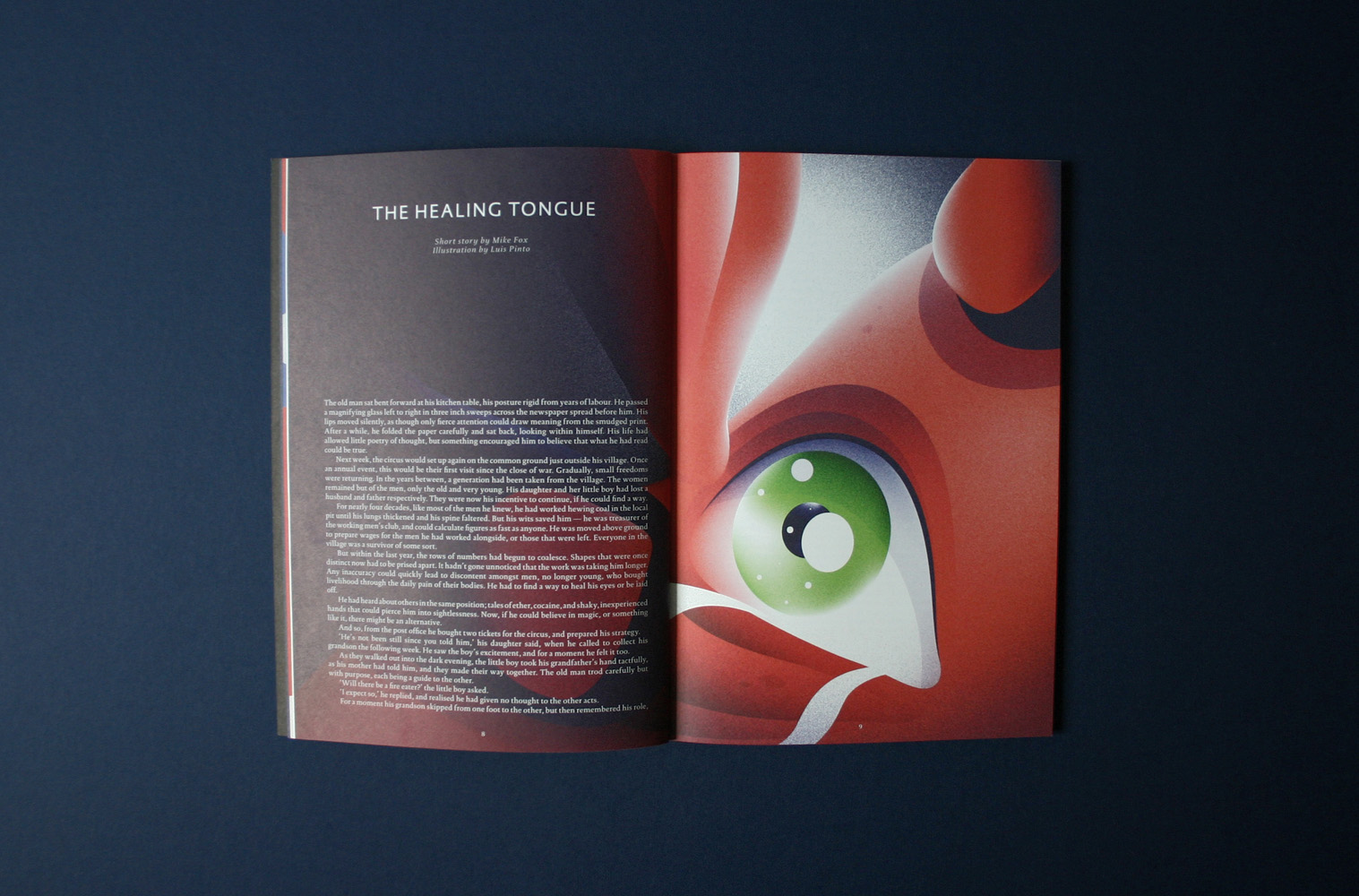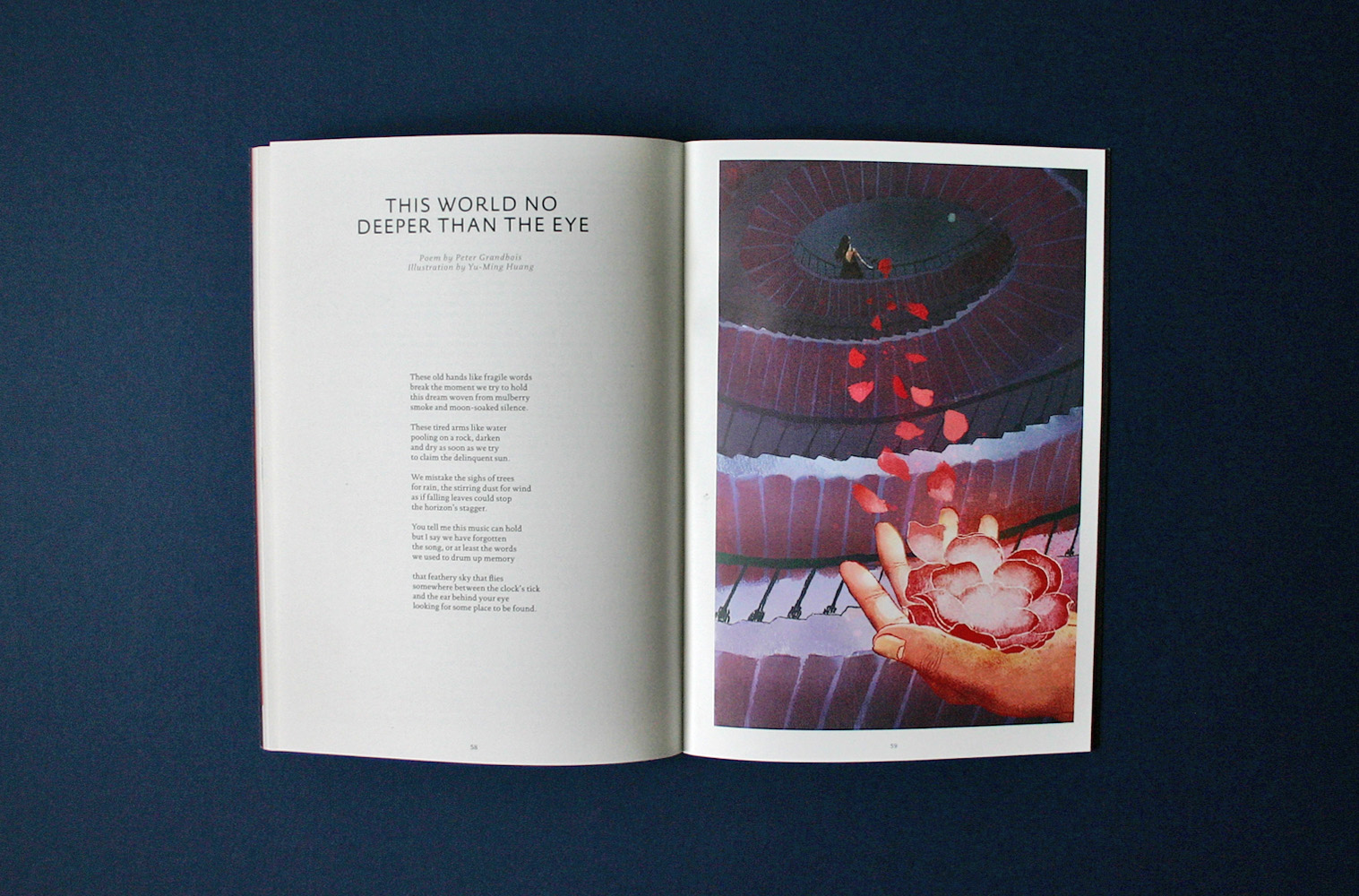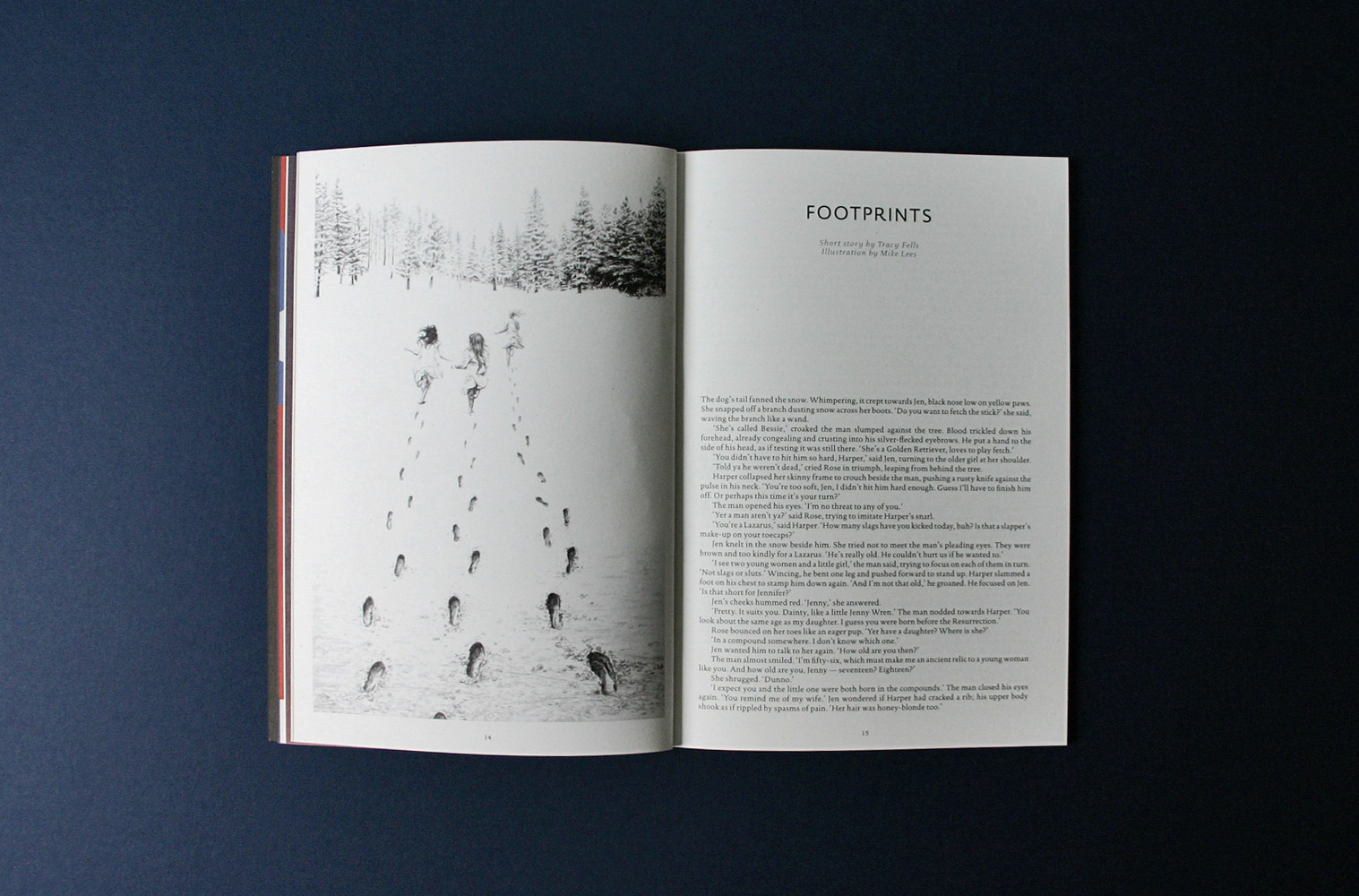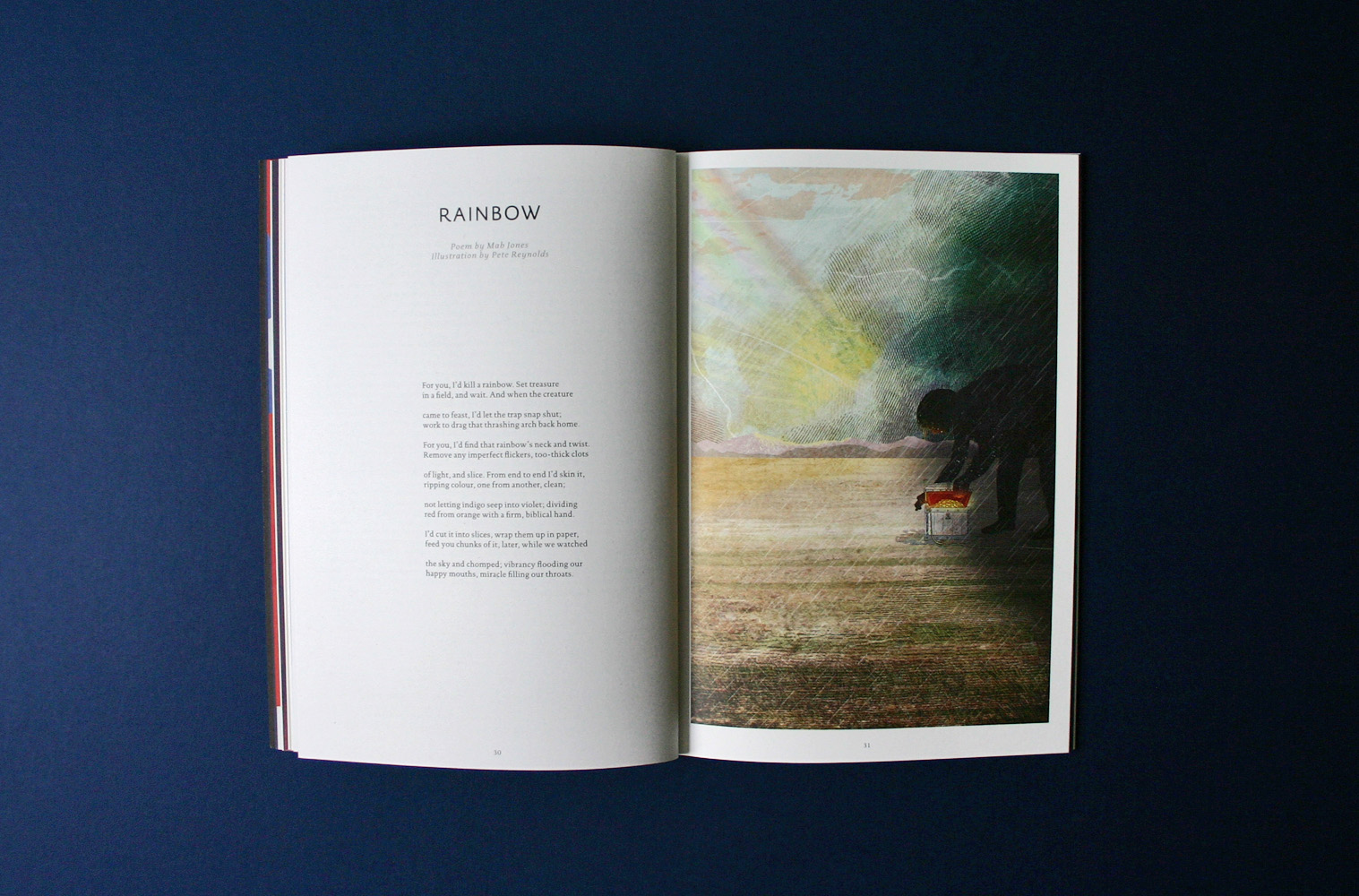THE BREAK-UP
A unique solution is arrived upon to rid the planet of conflict in Charlie Galbraith’s unsettling short story. Illustration by Matt Harrison Clough.
The decision was made at a global summit, attended by the leaders of every nation on the planet – those relatively few that were still left. Looking back, it might seem a little extreme, but at the time it made perfect sense. The general idea, as it was put to us, was: ‘If you can’t co-exist, then don’t’. It was a simple enough solution to an old problem and everyone, at least everyone I knew, agreed with it. The cities were mostly rubble, and the majority of the people that remained were country-folk used to having to walk a mile to their nearest neighbour, so it didn’t seem like all that drastic a change.
Not many remember the start of the conflict, but the gist of the disagreement was thus: one side felt that everything should be pooled and shared out equally, and the other felt that it was up to every man (and woman, some said) to stand on his own two feet and go out and get something if he felt he needed it. Blood was spilled over the matter – a lot of it, and for a long time. The fighting dragged on and on until it got to the point where there wasn’t much of anything left to go out and get, or pool and share out, whatever you felt should be done with it. And so, in desperation, the summit was called and a compromise was reached.
The story goes that at the summit someone on the one side shouted out, ‘No man is an island!’ and someone on the other side shouted back, ‘Well, maybe he should be!’ This got people on both sides thinking and, eventually, agreeing. The idea was to share everything out, as the one side wanted, but from that point on to let every man fend for himself, separate from all others. The world was to be broken up like a jigsaw, and everyone would get a solitary piece of the puzzle. It was called a ‘Time-Out for society’. Reset the clock, put everyone back on the blocks, and when you fire the starting pistol, ensure that people can’t but keep to their lanes.
The mathematicians all got together and calculated each person’s allocation of the planet’s combined raw materials and, most importantly, its land. 420 square metres (or 460 square yards, for those unfamiliar with the metric system). We received notification in the post, with a date some three months in the future scheduled for ‘The Break-Up’.
In the weeks following, reams of giant pneumatic hammers sprung up like weeds across the landscape, erected by teeming crews of workmen in white overalls. These, we were assured, were designed to be water-soluble, so that no man’s personal fiefdom would be spoiled by the unsightly metal structures. All we had to do was scrape off a surface-layer of paint on the day of dissemination and, as the land broke up, they would simply fall into the sea and dissolve in a pink fizz.
On the eve of the split there were huge parties, the last chance most of us would have for a simple get-together. There were hugs and tears and solemn goodbyes. There were also many drunken brawls and slurred oaths and bitter cries of ‘Good riddance to bad rubbish!’ as each stumbled towards the border of their personal patch ready for the big day.
At the specified time of 7:30am the following morning the hammers all came down simultaneously, like the flat of a teaspoon on the top of a soft-boiled egg. And, as the earth’s crust splintered and tore free of the mantle, they fell into the sea in a shower of component parts – as promised.
I’m sure most must have been counting down the seconds, but 7:30am proved a little too early for me after the celebrations the night before. I was rudely awoken by the almighty thud of the hammers, followed by a deafening compound crack that echoed out over the horizon. As seawater streamed in to fill the deep fissures that had appeared all around me, I just about had time to hold on for dear life to a nearby shrub as the ground pitched and rolled below me like a whale with an itchy fin.
Once things had settled down, I stood up and looked out as the landscape slowly floated away from itself and effervescent clouds of bright pink met and merged before gently dying down, leaving a dull brown lather on the surface of the sea.
From that point on there wasn’t much difference between one day and another, they all seem to run together in the memory. Right at the beginning, I made myself a hut from the timber I was allocated, so didn’t want for shelter. I spent most of my time in there, pawing through boxes of old keepsakes and mementos, lying back and reading, or listening to records (until I ran out of batteries) and eating tinned peaches. There was a beech tree that I used to sit under sometimes in the warm weather and a big flat rock that would heat up in the sun, on which I’d stretch out and bask like a lizard. I had been given seeds to plant, and did so fairly haphazardly. When they sprouted, I cultivated them just as haphazardly. I threw out most of my store of minerals. Gold, silver, copper, iron ore – all of it went overboard. Space was at a premium and metalwork wasn’t a skill I had ever acquired. I did, however, learn to fish, though I had never taken to it the few times I had tried it before the split. It had seemed like a lot of waiting around for nothing, but as I’d be doing that no matter what, I thought I might as well wait around with a line in the water and the slim prospect of a meal at the end of it. There wasn’t much else to do, other than to sit with my feet dangling over the sheer cliffs that surrounded my little isle and watch the lumpen silhouettes of others drift across the horizon.
Those first several years were spent in total isolation, as planned, but, for better or worse, it didn’t last.
I remember patching a hole in the roof of my shack one day when I looked up and saw what I took to be an injured gull floundering in the wind. I watched it for a bit as it dithered in the air, before flipping over and diving headlong into a thicket of bracken beside me. I went over to see if it was dead, prepared to stomp it out of its misery if it wasn’t, and found that it wasn’t a gull at all, but a paper aeroplane. I opened it up carefully and read the words ‘I’m bored’ that were scrawled across it in red pen. It was so strange to read someone else’s handwriting, someone else’s thoughts. I found a blue biro in the bottom of a mouldering cardboard box and wrote ‘Aren’t we all?’ on the line below, before folding it up and sending it on its way. As I watched it go, I felt like I’d made contact with an alien race, and I knew then for certain that I wasn’t alone in the universe. Of course, I’d known that anyway, but it was nice to be reminded of it.
That was the first time I encountered such a message, but they became increasingly common until they were pretty much a daily occurrence – just like the morning paper that used to appear on my doorstep, when I had one. I erected a net above my shack to catch these flying missives, but they soon began to arrive in other ways. I saw them taped to the legs of birds and, when fishing, it got to the point where I was pulling in more bottled messages than fish, and was glad for it. Most of them held little of any real interest – pornographic doodles, off-colour jokes, muddled ramblings – but it all helped disrupt the monotony. Sometimes, one would contain something genuinely useful – a recipe for nettle soup, a natural remedy for haemorrhoids, blueprints for long-distance paper planes. Very occasionally there was some real news of the outside world – a forthcoming eclipse, a recent seismic disturbance, etc. – and these were the real gems. Even though it was only ever on the level of gossip and hearsay, guesswork and speculation, this ramshackle network was the only conduit for information and I treasured it. Before, everything I knew, and could ever possibly know, had been restricted by how far I could see.
This is how I learned of the flotillas. I plucked a message from my net one morning, and written in a hurried hand was a warning: ‘Build a sail, if you can. If you can’t, pray.’ It was certainly unnerving, but very vague. Besides, I didn’t have the material for a sail so it was useless, to all intents and purposes, for I am not a religious man. But it aroused my curiosity and I resolved to keep my eye out for anything that might shed some light on it. More descriptive accounts weren’t a long time coming. They began to flood in and I was able to piece together the essence of what was going on fairly quickly.
At places where ocean currents crossed paths there had been collisions between one island and another. And sometimes, when these islands came together the people who lived there made sure that they stayed together. They lashed trees to one another across the divide with vines or hemp-rope. Some had mixed rudimentary cement to paste along the borders. Often, they would just sit and fish, and enjoy the benefits of conversation and companionship. Occasionally, however, the inhabitants of these joint islands, with their combined resources, would be able to erect a sail large enough to propel themselves through the water – albeit at glacial speeds. Together they outnumbered the inhabitants of any other single island and, as they could actually move, it made the others little more than sitting ducks. As a species, we aren’t shy of pressing home an advantage; consequently, many of them took to piracy, hoovering up every island in their vicinity, amassing land and resources and people. The most ravenously successful of these pirate armadas grew to humungous sizes in the space of only a few years.
I read of these aggressive flotillas operating at almost every point of the compass (though I hadn’t thought to bring one with me and so had no idea where I was in relation to them). They had names like ‘The Anschluss Boys’ and ‘утопия’ (whatever that means), or in some cases just crude symbols. Some of the accounts I read praised them, encouraging submission – ham-fisted propaganda describing island Shangri-Las circulating in tropical seas with promises of umbrella cocktails and suggestive drawings of concubines in hula-skirts. Others, apparently first-hand accounts, decried them as brutal and coercive. There were horror stories of women kept in chicken coops and pig pens, taken out periodically like library books and deposited back with torn clothes and dog-eared pages.
But for all the invitations and warnings, without the means for a sail all I could do was sit and read about what was to happen to me as I drifted inescapably towards it.
Some time passed – I can’t be exact or even approximate – and they came for me. I saw it from a long way off, a great hulking mass of land stretching across the horizon with scores of enormous painted sails billowing in the breeze. I felt a surprising upswell of emotion in my breast, like a sailor coming back to shore after a long voyage, only it was the shore that was coming back to me.
I had time to tie myself to the beech tree near my shack so I wouldn’t be thrown into the water by the impact. It loomed ever closer, throwing me and mine into shadow, eventually eclipsing everything else in sight, until finally it hit. There was a loud boom and the ground shuddered, throwing up a cloud of dirt. The island rocked violently, but it held together. My shack, however, collapsed in on itself pathetically. They boarded, men just like myself – unshaven and clad in rags. Most headed straight to the ruin of my old hut to rifle through my things, but one came straight over to cut me loose from the tree. He lead me gently by the arm over onto the mainland, whispering softly to me in a foreign tongue and pressing the sharp point of a kitchen knife into the small of my back.
They marched me to their camp, a mile or so inland. It felt very strange to walk in a straight line for so long. After 400 yards I had an almost irresistible urge to turn 90 degrees. They took my supplies, of course, and added them to a mountainous store. They did let me keep my little box of old photos and trinkets, which they needn’t have done. Some among them spoke English and they explained what would happen to me. Join them, they said, and I would enjoy the fruits of their conquests. They told me that this store was just one of many on the raft, and one of the smallest at that. They did not need to explain what would happen if I refused.
I was shown a rough map, which I didn’t recognise, drawn with chalk on a weather-beaten blackboard. It was full of blank spots and question marks, marred by countless rubbings out, lines drawn and redrawn a hundred times over. It was littered with tiny dots, and a handful of large, awkward shapes. They pointed to one of the shapes and this, I was told, was us. They then pointed to some of the other shapes and explained about rival continents, disputed territories, fragile allegiances. They asked if I had any knowledge of engineering or chemistry, or training with the police or military. They talked at me for hours about their cause, their beliefs, their struggle. I nodded and agreed with them and they were pleased. They gave me words to memorise and to repeat back to them with my hand on my chest and, once I had done that, they shared out cups of pineapple wine and we drank into the night.
With dawn threatening to break and the others asleep, I took a sheaf of paper and a biro from my box of keepsakes and tiptoed down to my old island, now the prow of the great raft. I folded my words up into one of the glider shapes I had learnt, and on the next strong gust of wind I cast them up and out towards a faint spot on the horizon, then turned and trudged back through the gloom towards camp.




